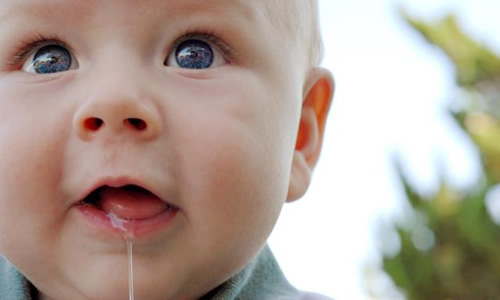Drooling in babies
Drooling in babies begins at the age of about 3 months and in most cases it is a normal part of natural physical development. This is a result of maturing of the parotid glands (large salivary glands, which are activated by eating). At this time, babies also learn how to chew, but they haven’t learned how to swallow their saliva yet. Drooling is important for babies – once your child starts to eat solid food saliva washes away the bacteria from the mouth, plays important role in digestion and helps neutralize stomach acid. Excessive salivation starts when teeth start to grow and in this case saliva relieves teeth pain. Drooling can also be a sign of developmental delays and be a result of impaired chewing muscles. In the course of normal physical development, it can cause some minor troubles – such as irritate skin on the chin and creating a red rash. In this case you should try to keep your baby’s skin dry and use lanolin ointment to ease skin irritation.

Drooling in toddlers
Sometimes toddlers have underdeveloped swallowing mechanism – ability to swallow properly and at a right time. The ability to swallow may be delayed because of premature birth; in other cases, it must be normal accordingly to the child’s age. In the case of drooling after the age of 3, you should address your doctor, especially if the child shows other signs of neurological damage or delays in language or gross motor skills. There are some cases of excessive salivation when the child’s nervous system might be impaired and in this case, it interferes with muscle control in the mouth and face.
Drooling in adults
Drooling can also occur in adults. There is a list of different medical conditions that can lead to excessive salivation: cerebrovascular stroke, cerebral palsy, Bell’s palsy, allergy and common cold or respiratory infections, drug side effects (Pilocarpine, Compazine, Thiothixene and Dantrium), gastroesophageal reflux or any infection of the mouth (for example, salivary gland infection). Some complications because of excessive drooling may appear with the patients with cerebral palsy and cause problems to them and their caretakers. These include perioral skin infections, dehydration, problems in interaction with the others (because the communicative device is wet and damaged), frequent changing of clothes etc.
This problem is frequent in pregnant women because their salivary glands are more lubricated due to nausea and morning sickness. Drooling becomes very problematic in the case of uncontrolled vomiting also known as Hyperemesis Gravidarum.
It is also common for elderly people with Alzheimer's or Parkinson's disease. Sometimes drooling can be caused by serious diseases like esophageal and laryngeal cancers.
Drooling while sleeping: causes and treatment
Saliva flow is also very typical while sleeping and in most cases it’s absolutely natural thing. It happens for a number of reasons. First of all, when sleeping you cannot swallow the amount of saliva you produce like you do when you’re awake, what makes excessive saliva drool out of the mouth. This happens mostly with people who like side sleep posture. Medical reasons that cause drooling in the sleep include sinus infection, acidity or GERD, allergies, tonsillitis, dental problems, taking certain medicines, neurological disorders or specific anatomy of your mouth.

If drooling causes inconveniences or even troubles and you want to get rid of it, you should first identify the reason. If it happens because of the sleeping posture, try to sleep on your back to help saliva flow to the back of your throat. In this case, it’s also good to prop your head up what will help keep your mouth shut and try to breathe through your nose, because mouth breathing is also one of the major causes for drooling at sleep. In the case of any health issues or side effects of medications it is better to consult a doctor to find a solution for the problem.
0 comments:
Post a Comment